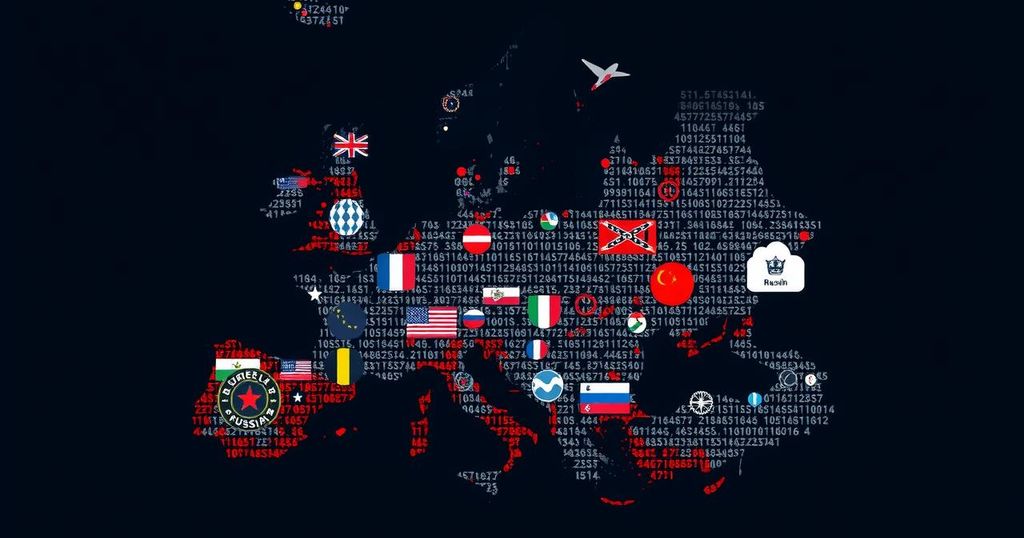Investigations into the Czech online portal “Voice of Europe” reveal its role in spreading pro-Russian propaganda across Europe. Authorities in Czechia and Poland are scrutinizing the operation, which is implicated in funneling money to politicians, including AfD candidate Petr Bystron. The portal is linked to Viktor Medvedchuk, an oligarch with ties to Putin. Experts warn of a broader Russian strategy to sow division and influence public opinion, emphasizing the importance of addressing these threats ahead of upcoming European elections.
Recent investigations have indicated that a Czech online portal, “Voice of Europe,” may have been instrumental in disseminating pro-Russian propaganda throughout Europe. In response, Czech authorities are taking action against the operator of the site, and Poland is also conducting inquiries. Reports suggest that financial contributions may have reached various politicians, including Petr Bystron, the leading candidate for the European elections from the Alternative for Germany (AfD) party, who has denied these allegations. The Czech Ministry of Foreign Affairs has classified “Voice of Europe” as part of a Russian influence operation aimed at undermining Ukraine’s territorial integrity, sovereignty, and freedom. The operation is reportedly connected to Viktor Medvedchuk, an oligarch facing treason charges in Ukraine, who has strong ties to Russian President Vladimir Putin and was recently placed on a sanctions list. Christopher Nehring, a guest lecturer on disinformation for the Konrad Adenauer Foundation, noted that such operations are not new, indicating a strategy where wealthy individuals, funded through state contracts, establish networks both domestically and internationally to manipulate public discourse. Notably, the alleged payments to politicians represent a significant new development in these operations. “Voice of Europe” operates from Prague and is active on social media platforms, including Facebook and X (formerly Twitter), where it boasts over 180,000 followers. The platform is viewed as a source of pro-Russian and populist propaganda. German Interior Minister Nancy Faeser remarked on the substantial reach of misinformation campaigns: “We again see the massive extent of the lies and disinformation with which Putin’s regime seeks to shake trust in our democracy, incite anger, and manipulate public opinion.” She emphasized the importance of uncovering this influence operation ahead of the European elections, calling it a significant blow against Russian propaganda. Czech media, citing intelligence sources, reported that cash payments were made to politicians from Germany, France, Poland, Belgium, the Netherlands, and Hungary during visits to Prague. The operations are estimated to have involved six-figure sums, which Berlin’s Interior Ministry described as “illegitimate” Russian influence attempts on the European Parliament. Pia Lamberty from the Center for Monitoring, Analysis, and Strategy (Cemas) argued that the rise of far-right movements across Europe renders societies more susceptible to disinformation. She anticipates that attempts at manipulation will continue externally, particularly from Russia. Nehring elaborated on the dual aims of such initiatives: not only to exert influence but also to sow societal division. Vera Jourova, Vice President of the European Commission, predicted further revelations, asserting that what has been uncovered is merely the “tip of the iceberg.” She believes that the number of compensated politicians or influential individuals in society is likely much larger than currently disclosed.
“Voice of Europe” has emerged as a focal point in discussions surrounding Russian disinformation campaigns in Europe, particularly amid rising geopolitical tensions. The portal has been connected to a broader strategy of influence by the Russian government, targeting both political stability and public sentiment in European nations. The association with oligarch Viktor Medvedchuk, known for his closeness to the Kremlin, raises significant concerns regarding the integrity of various European political processes, especially with elections approaching. The implications of financial transactions between Russian operatives and European politicians indicate a potential infiltration of domestic political systems, fueling fears about the erosion of democracy and the impact of foreign propaganda.
The revelations surrounding “Voice of Europe” signify a grave concern regarding the extent of foreign influence within European politics, particularly by Russia. Investigations highlight not only the dissemination of propaganda but also potential financial entanglements with politicians across several countries. As authorities work to combat these operations, the increasing vulnerability of societies to disinformation becomes apparent, particularly against the backdrop of mounting far-right sentiments. This situation underscores the need for vigilance and transparency in the face of foreign attempts to undermine democratic processes.
Original Source: www.br.de

Leave a Reply